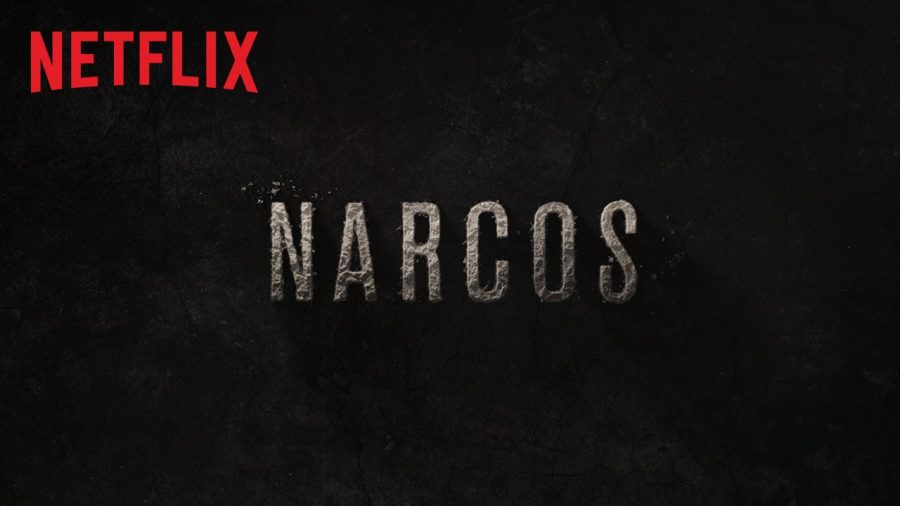By Siddharth Jejurikar ’16, Entertainment Editor
“He who fights with monsters should look to it that he himself does not become a monster. And when you gaze long into an abyss the abyss also gazes into you.” Nietzche’s words from Aphorism 146 of his work, Beyond Good and Evil, ring true throughout Netflix’s new crime drama, Narcos. Narcos takes the intriguing story surrounding the rise of the notorious Pablo Escobar’s cocaine empire in Colombia and uses it to depict the nature of human morality and the relativity of what people consider good and what people consider evil. The show brings together a plethora of elements in a way that brilliantly highlights its message. There is the excellent production quality that has come to be associated with Netflix titles, the fantastic acting from Wagner Moura, Boyd Holbrook, Pedro Pascal, Raúl Mendez, and Maurice Compte, and a subject matter full of gravity, tension, and grit. Though a few deviations from reality, shortfalls in acting for some of the minor roles, and an oftentimes jarring and redundant use of narration mar what could be considered a masterpiece, the overall product is still incredibly enticing and worth watching.
As much as the show is about the rise of the Medellín cartel, it is about the brutality of war and the conflicts between characters. As DEA agents Javier Peña (Pedro Pascal) and Steve Murphy (Boyd Holbrook) work from inside of Colombia to bring down Escobar’s power regime, navigating both enemy territory and the subversion of the CIA and military (who give precedence to the struggle against communism over The War on Drugs), they are faced with complex moral choices and intense moments that try their sense of self. Towards the end of the first season’s semi-framed narrative, you can see changes within Murphy’s character as he slowly becomes that which he defines as evil. “In Colombia, good and evil are relative concepts,” says Murphy, demonstrating his evolution into a much more jaded individual. Meanwhile, Moura’s astounding work as Pablo Escobar serves the show well, allowing it to construct the believably complex character that he would need to be. Narcos takes no Hollywood shortcuts, making every single character more than a simple binary of good and bad. Moura shows us a man of ambition, charisma, and unquestionable temper. Moura shows us a man who would kill with his bare hands, while holding nothing in higher regard than his family. With the potential to be good and the image of Robin Hood surrounding him, Narcos’s interpretation of Pablo Escobar’s character is both captivating and disturbing.
The show isn’t short on edginess, but in this golden age of television—where shows like Game of Thrones derive popularity from their willingness to show anything—just being edgy isn’t enough. Luckily, Narcos doesn’t fall into this trap too often. Gore and violence are used as tools not crutches in the show, a demonstration of mature directing and screenplay. Depicting the utter brutality of Pablo Escobar’s war against the world, Narcos is an emotional maelstrom that falls just short of putting the viewer at the scene. Despite depicting the story’s brutality with depth and affect, the show falls short in its use of sex as a narrative aspect. Though certain instances, such as scenes showing Javier Peña’s perpetual attachment to informants, add to the show’s overall depth, it sometimes follows in Game of Thrones’s unfortunate missteps by depicting sex frivolously in a way that only disrupts a great character drama. Other than that minor shortfall, the only major negative of Narcos is the unnecessary addition of Murphy’s incessant narration. Though it can be helpful at times, exploring historical context, giving the jarring statistics of the Medellín cartel (such as the millions of dollars Escobar and his associates would receive daily in exchange for hundreds of thousands ounces of cocaine), and providing insight into some of the intricacies of Murphy’s character, the narration is more often than not annoying—telling the viewer information that would have been much better to show.
Despite its shortfalls, the first season of Narcos is still incredible, with its positives outweighing its failures. The show uses Spanish where appropriate, forbidding characters who wouldn’t have any reason to from speaking English. The show, also filmed in Colombia, doesn’t take many shortcuts. Though the use of non-Colombian actors is said to be a major failure, I did not find the differences in accent to be very noticeable to the lay American viewer. With this immense amount of realism and production quality, the intensity of the plot and characters are heightened and accented. Season one of Narcos proved that the show has the direction and tools to be a masterpiece, and falls only slightly short of doing so. With (most likely) only one more season, the show is primed to continue its mastery of character development and tonal intensity, and I am hopeful that this second season will blow competitors out of the water with more of director Joeé Padilha and writer Chris Brancato’s captivating interpretation of history.
Sidd’s Recommendations:
The Wire (2002-2008): This show, starring Dominic West and Lance Reddick, is commonly referred to as the best piece of television of the 21st century for good reason. Taking a look at the drug problem from domestic side, The Wire brilliantly depicts the struggle of life in inner-city America and the futility of the government’s War on Drugs in this five season drama. As President Gaviria says when offered military support from the United States in Narcos, “According to the latest study, 660 tons of cocaine was consumed in the U.S. last year. Perhaps if your resources were focused at home, we’d all be better off.” Though The Wire focuses mainly on heroin, it echoes the sentiments of Narcos, showing a war happening on the streets of a nation with drugs being the cause and with civilians consistently caught in the cross-fire.
Image Source: http://variety.com/2015/digital/news/netflix-narcos-pablo-escobar-debut-1201528131/






